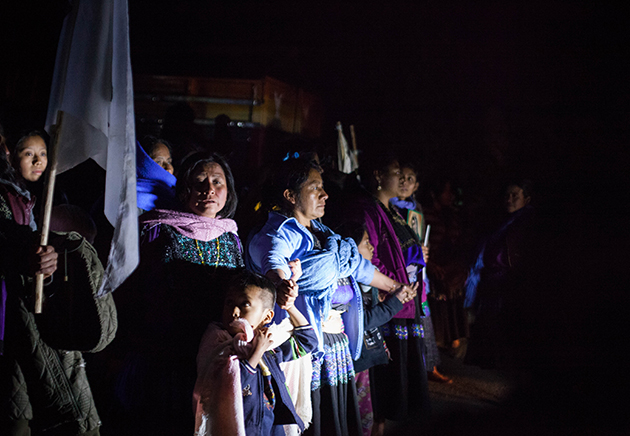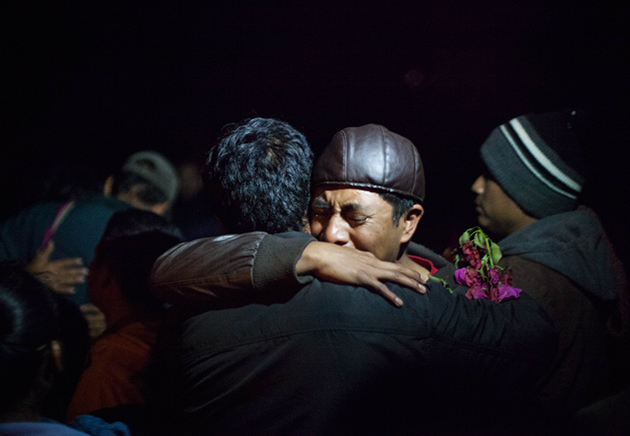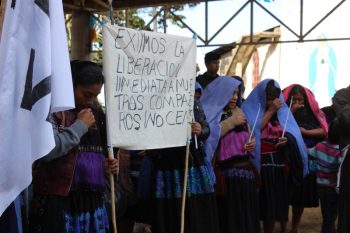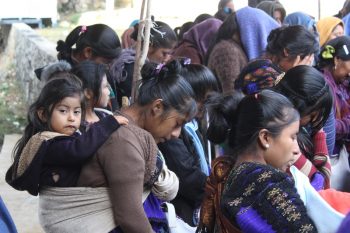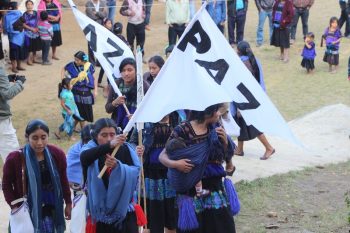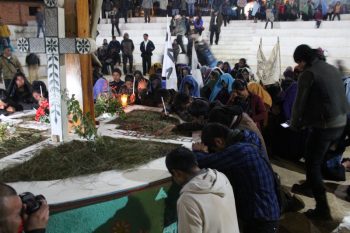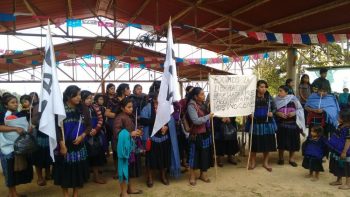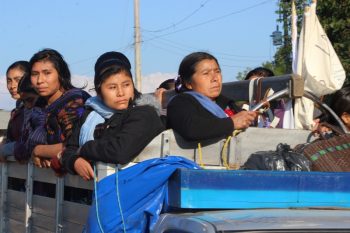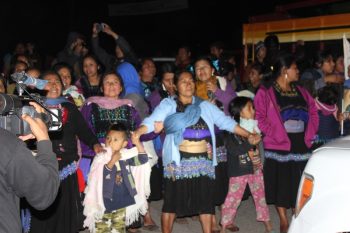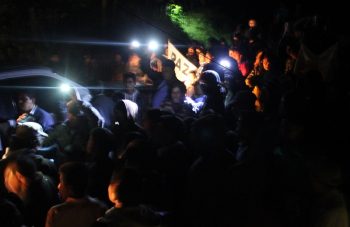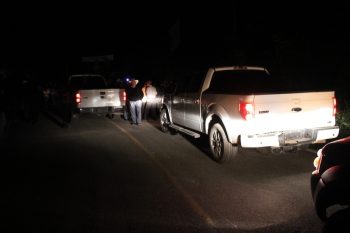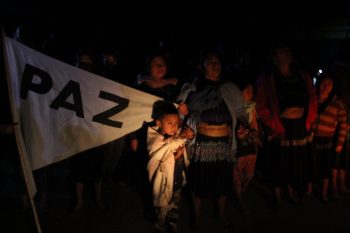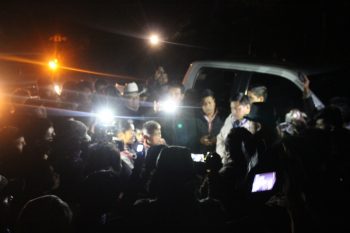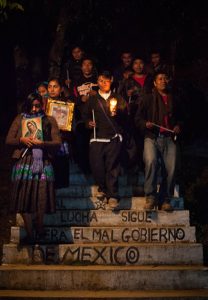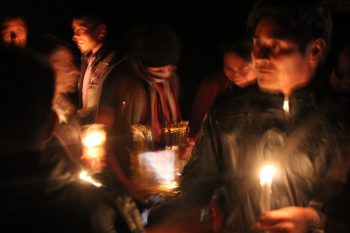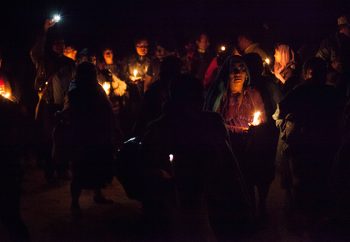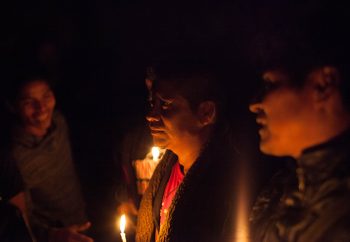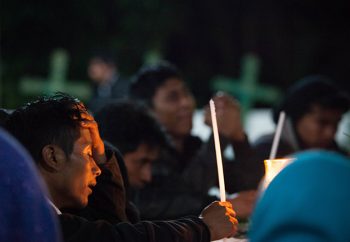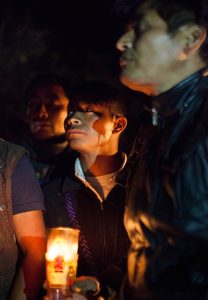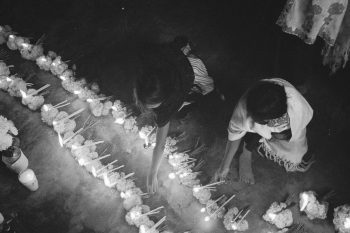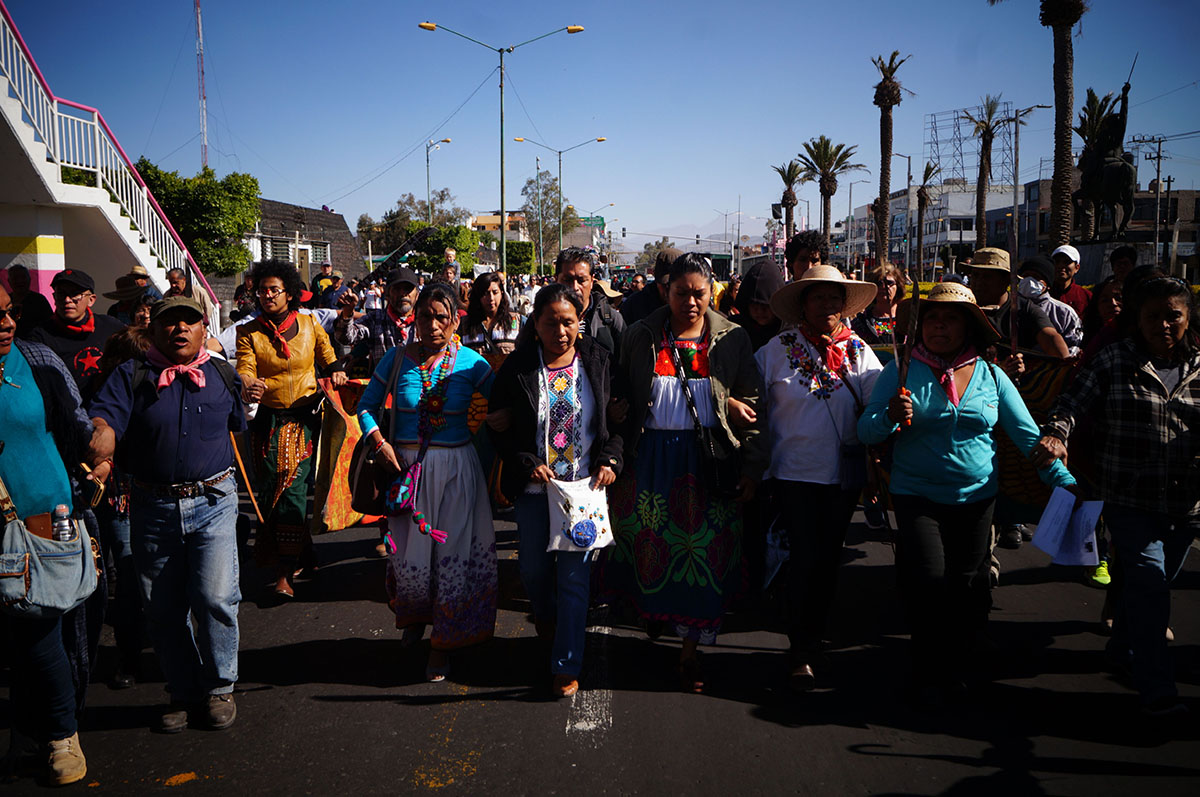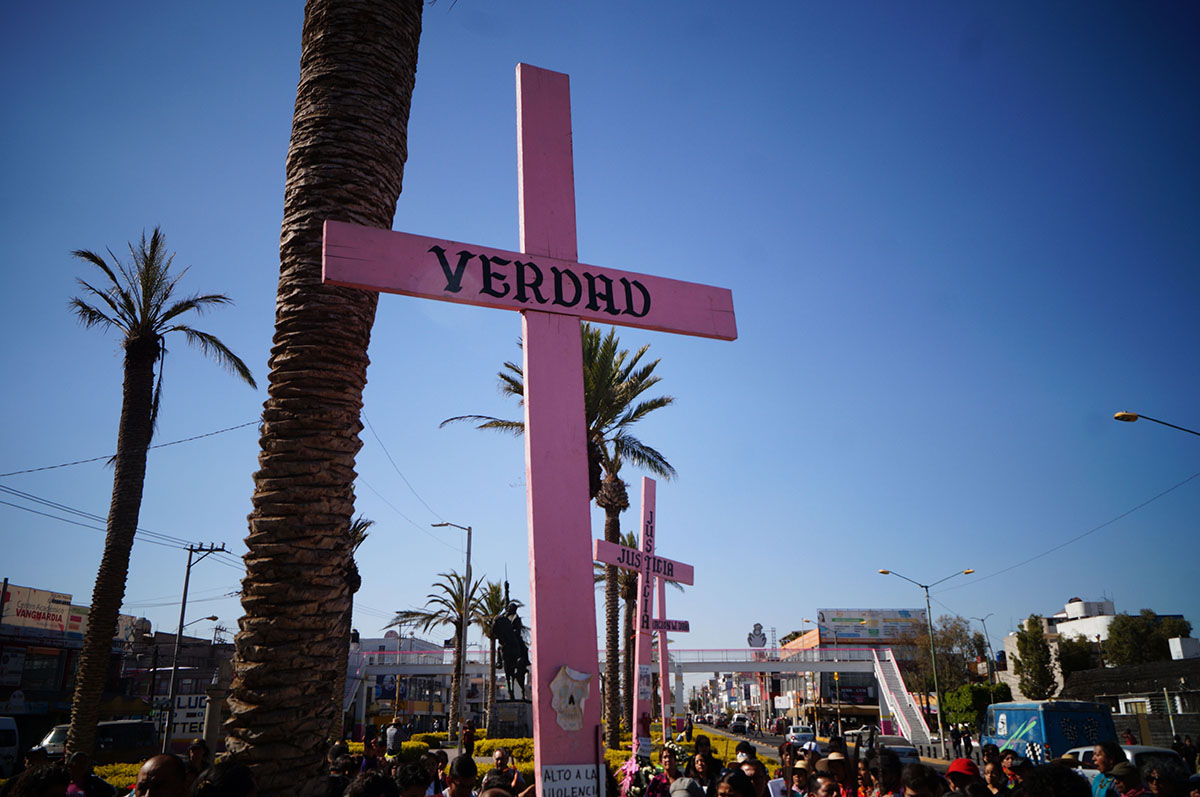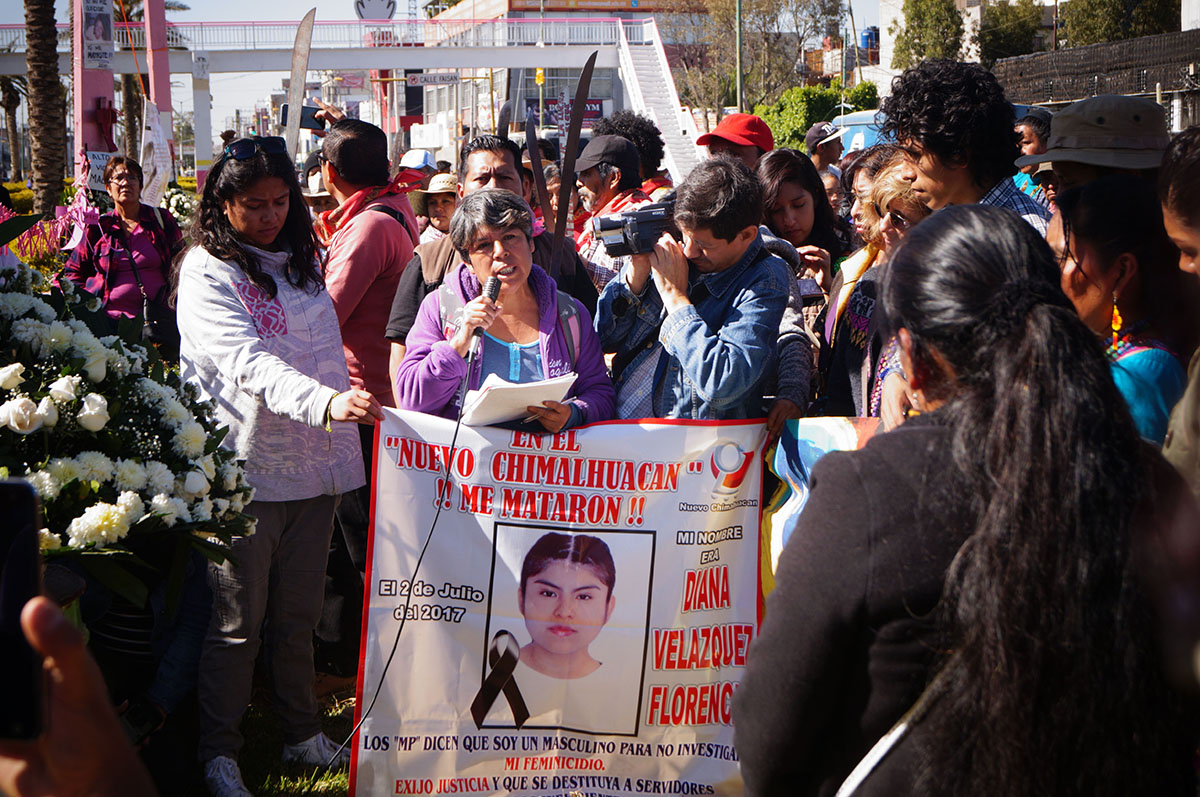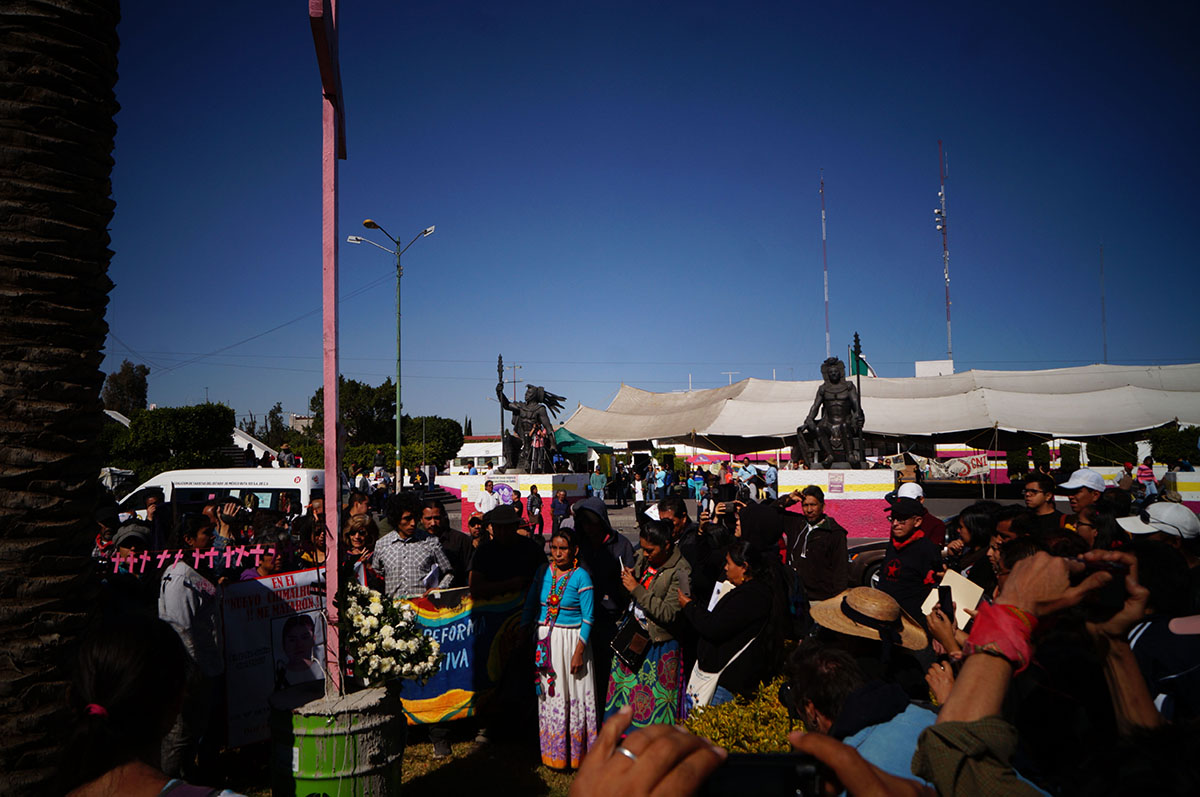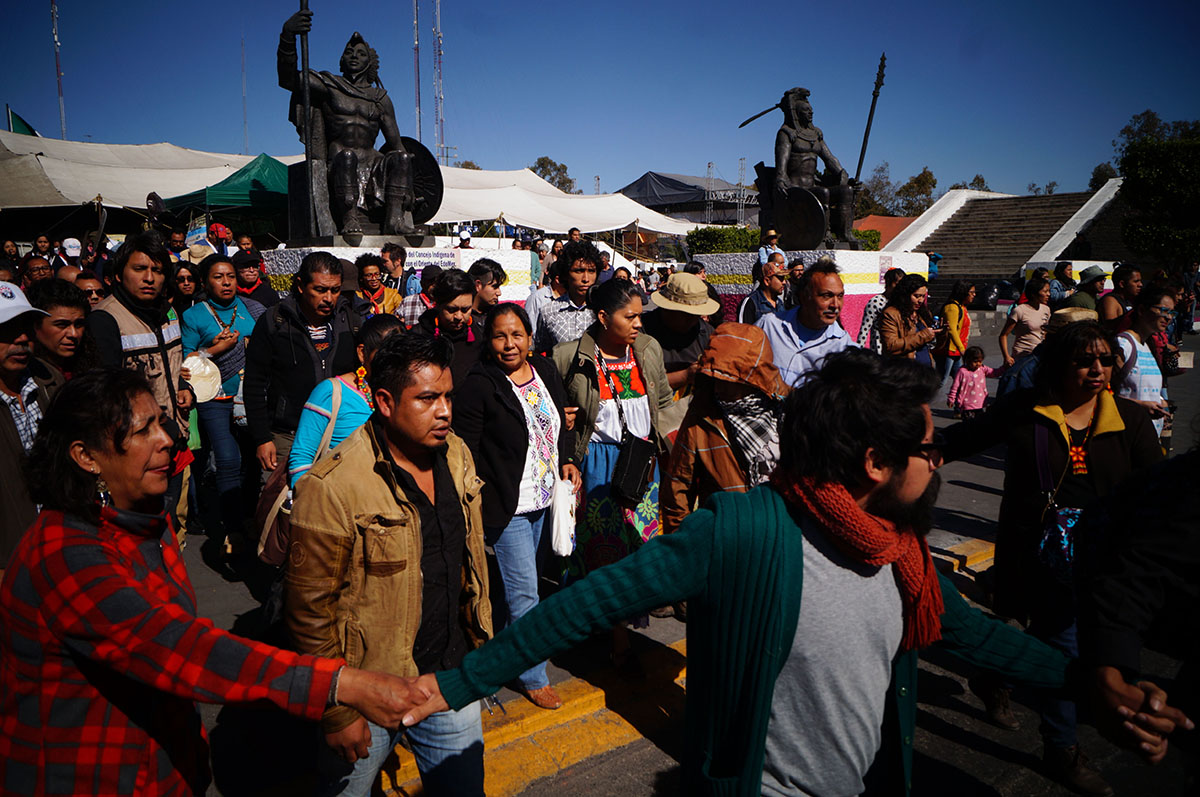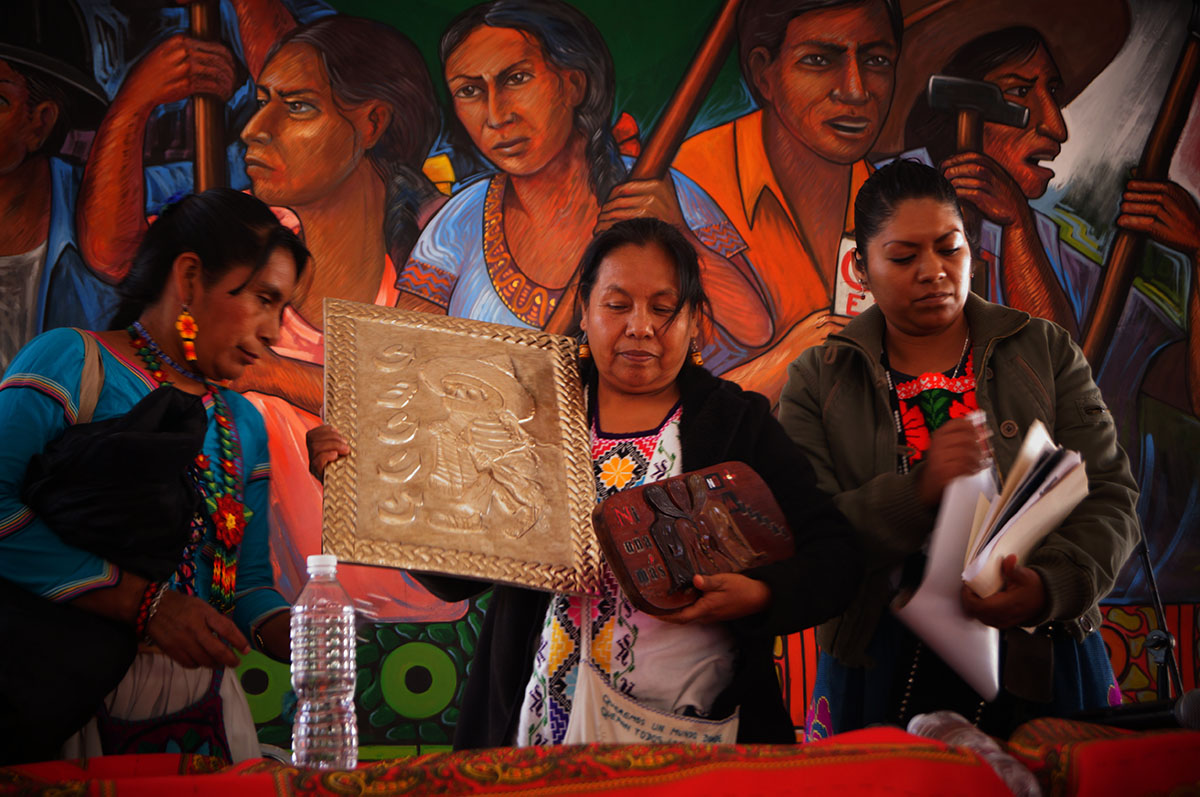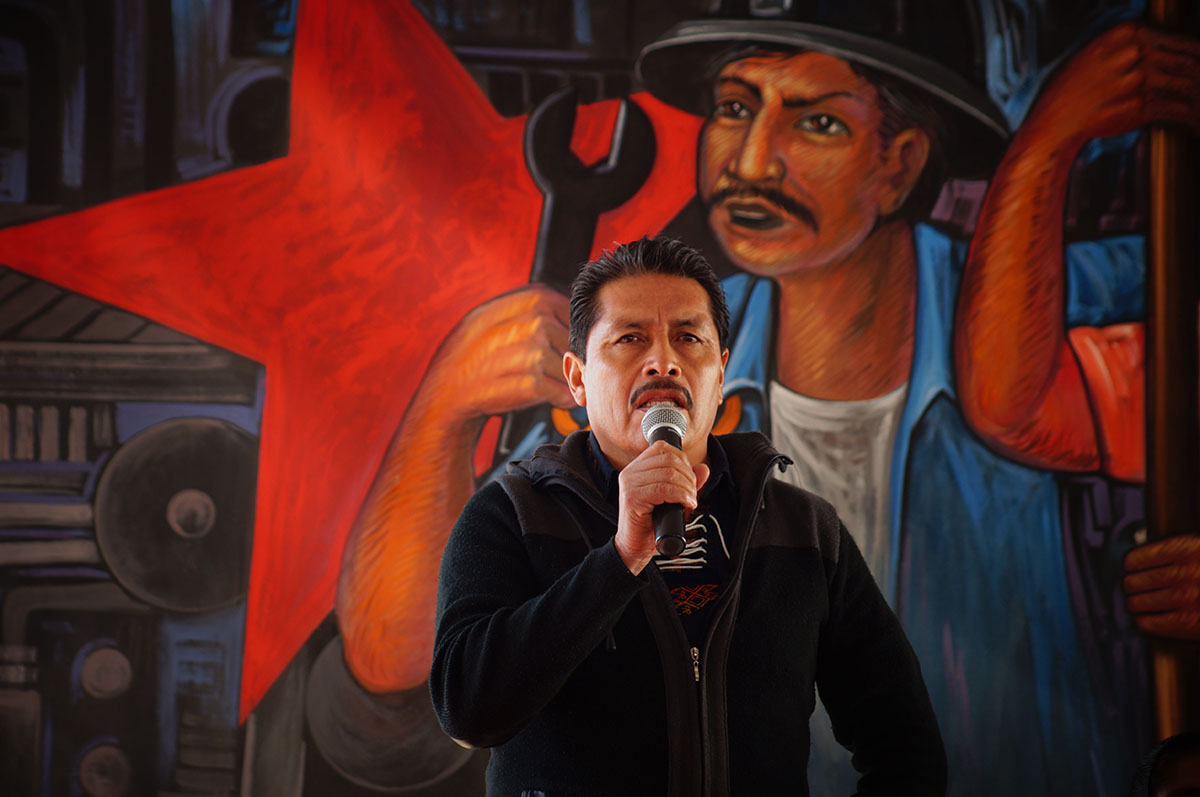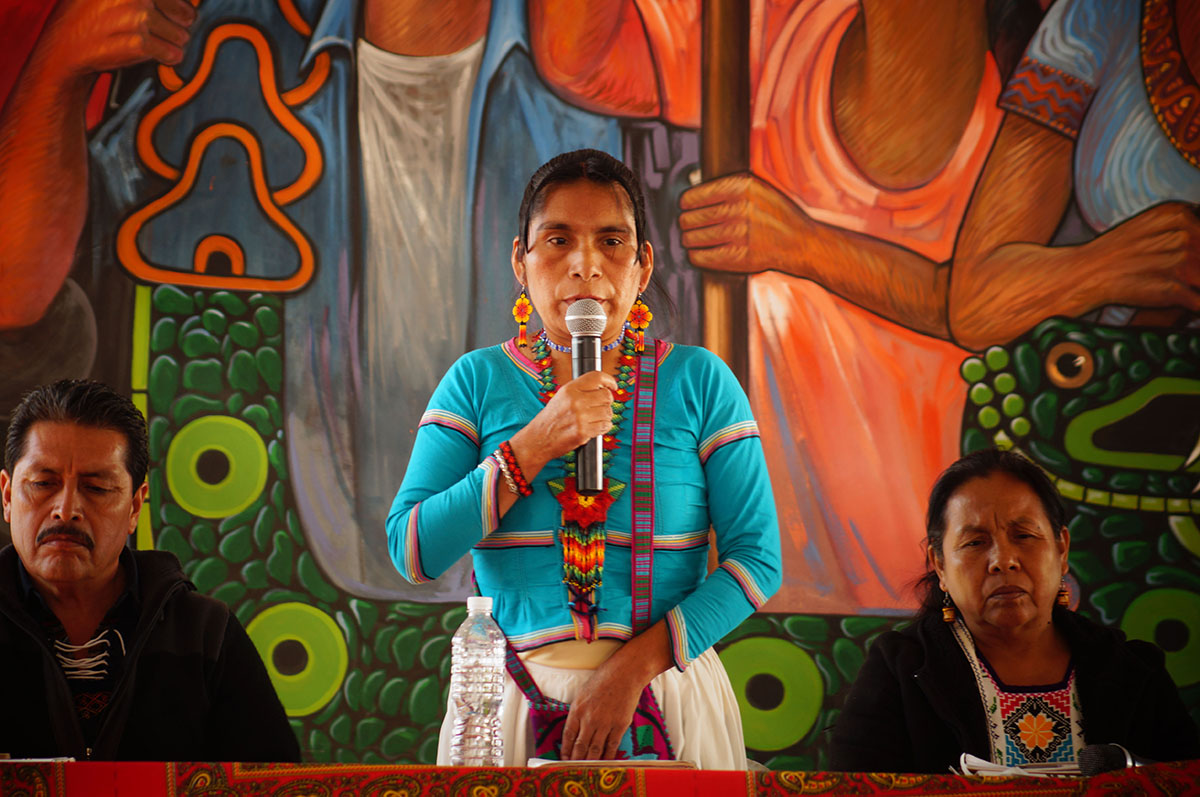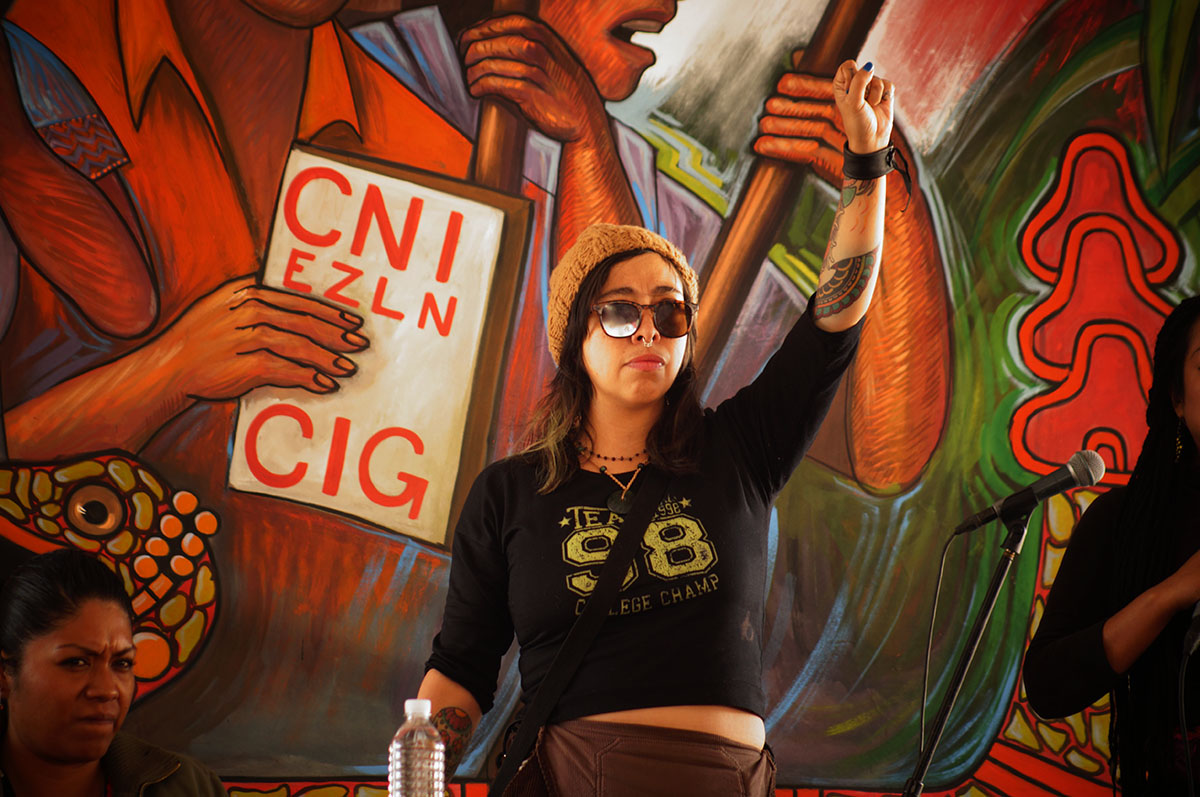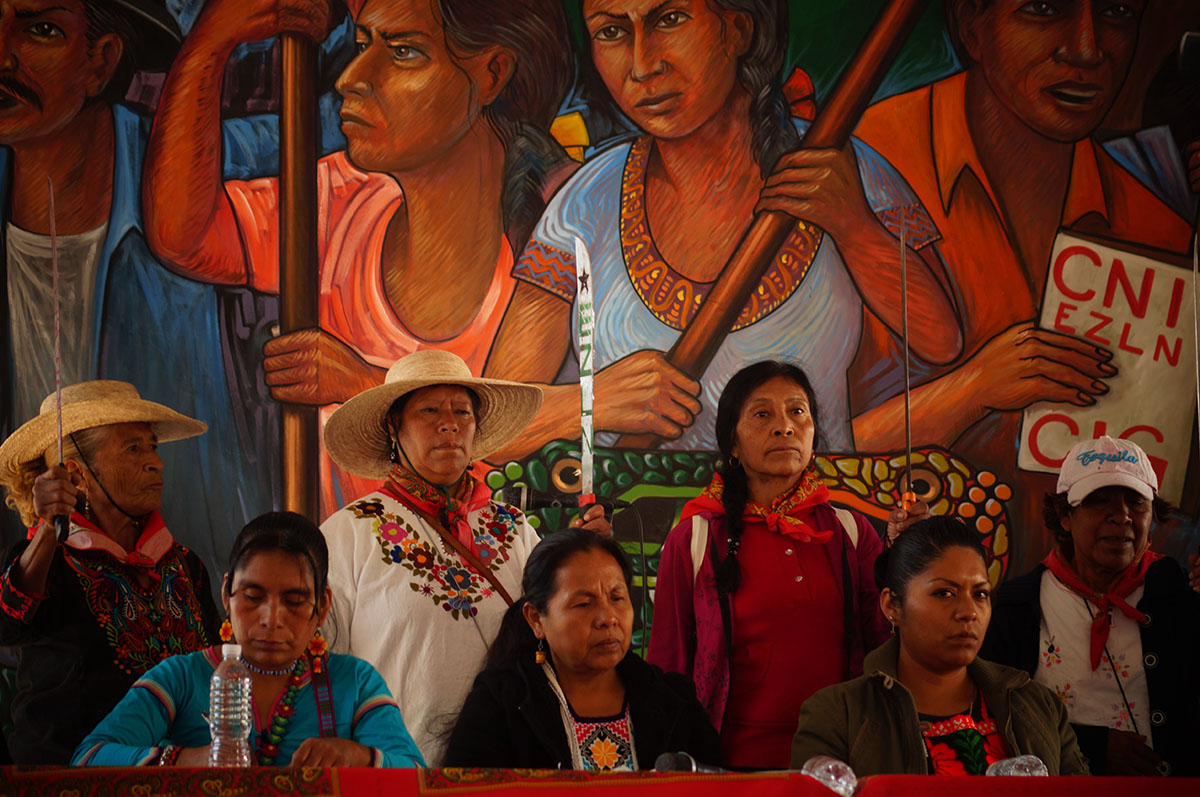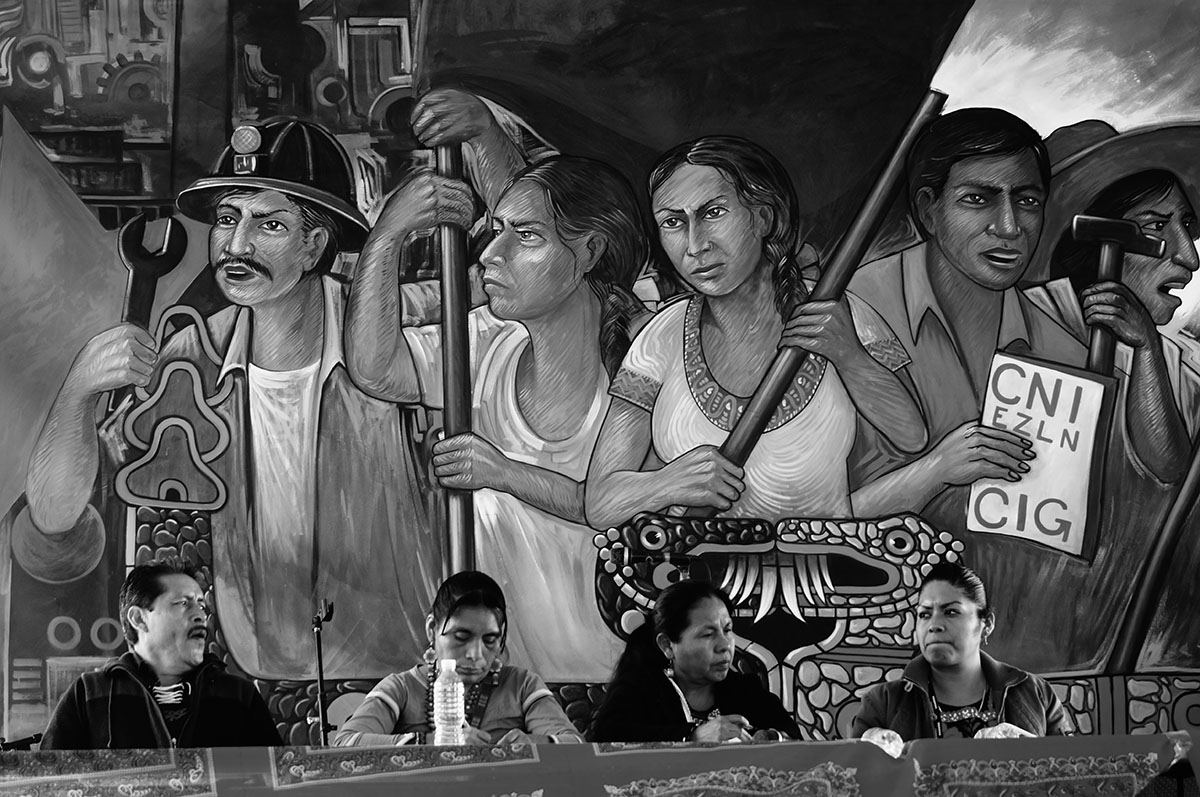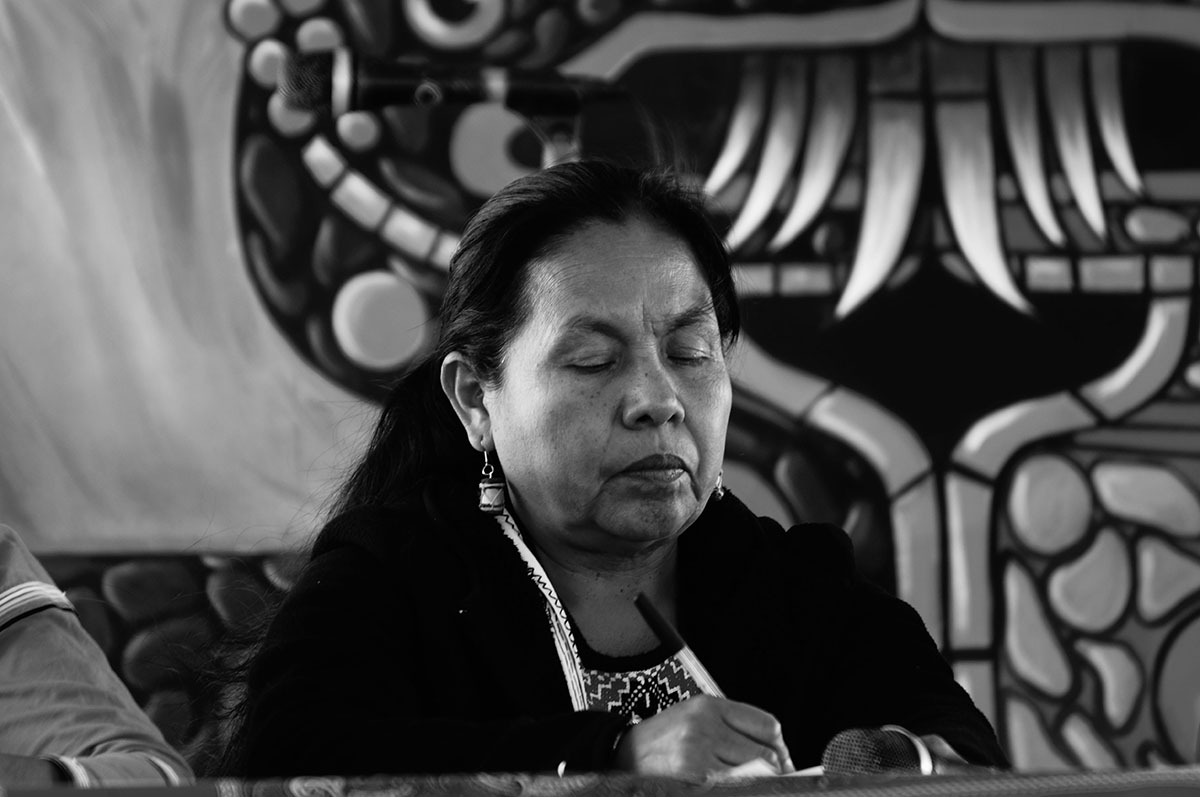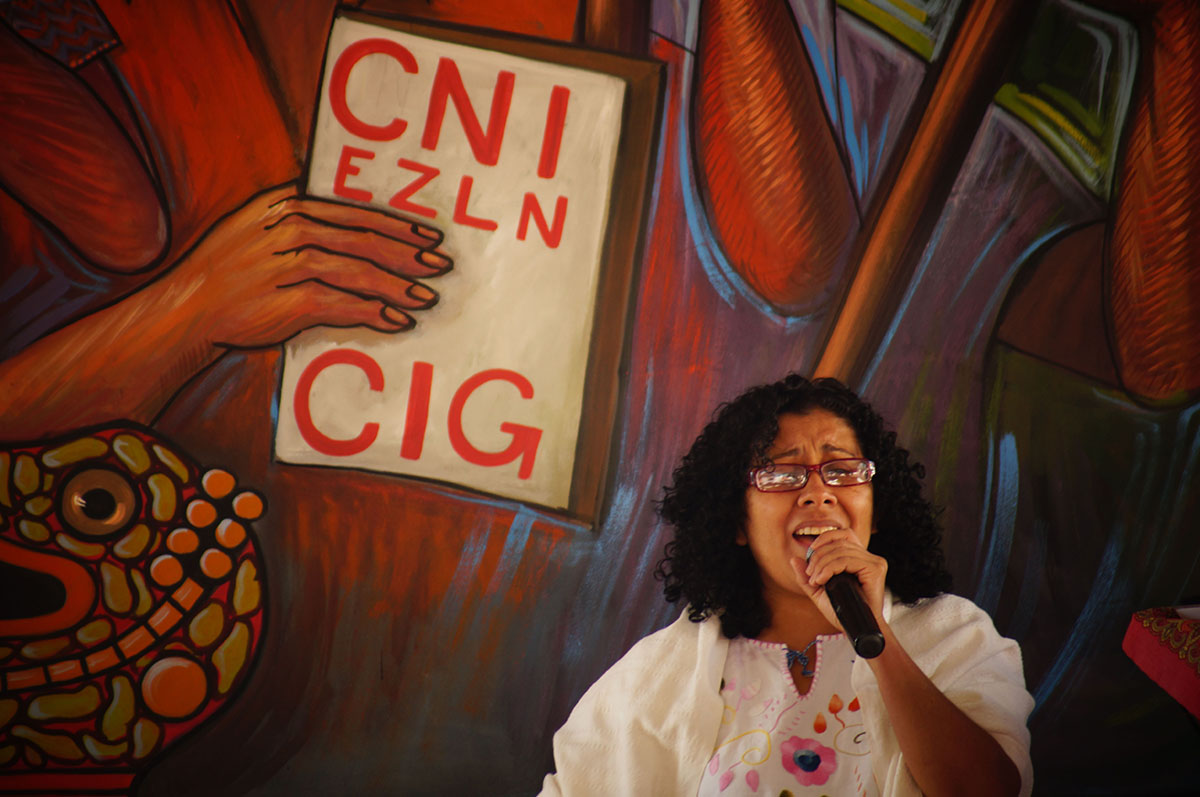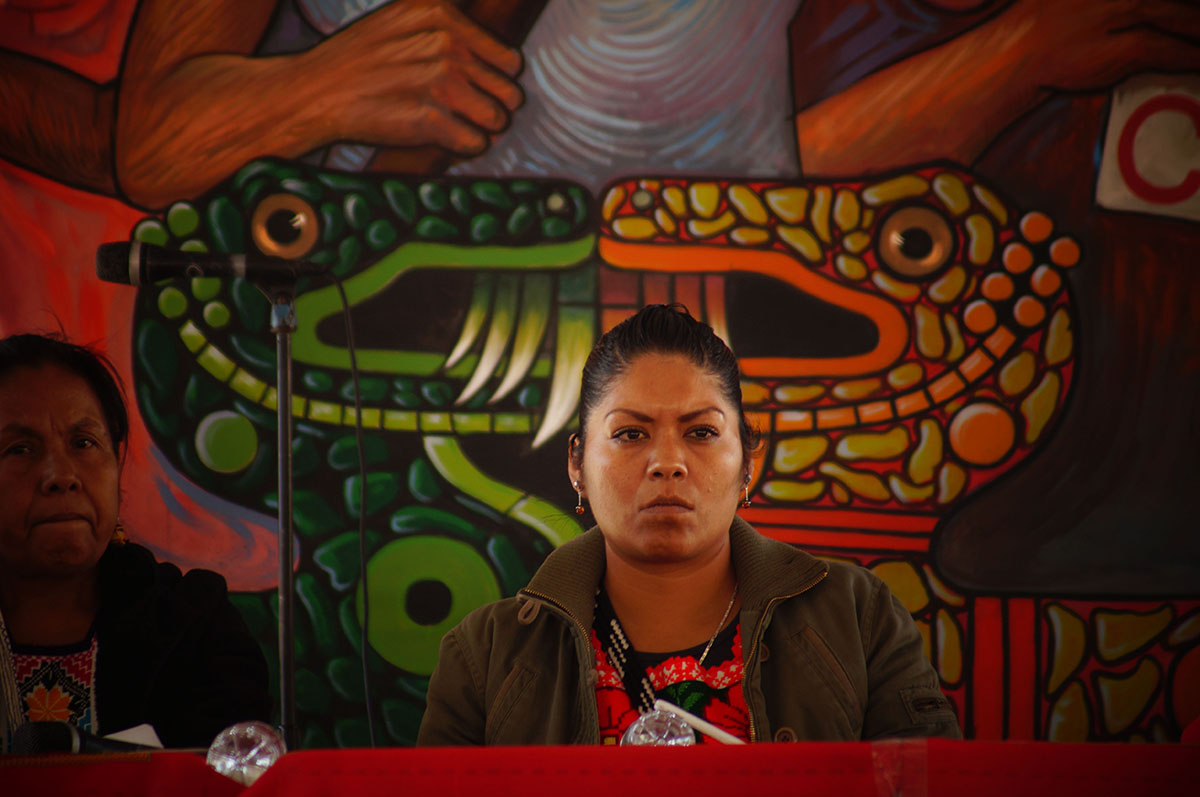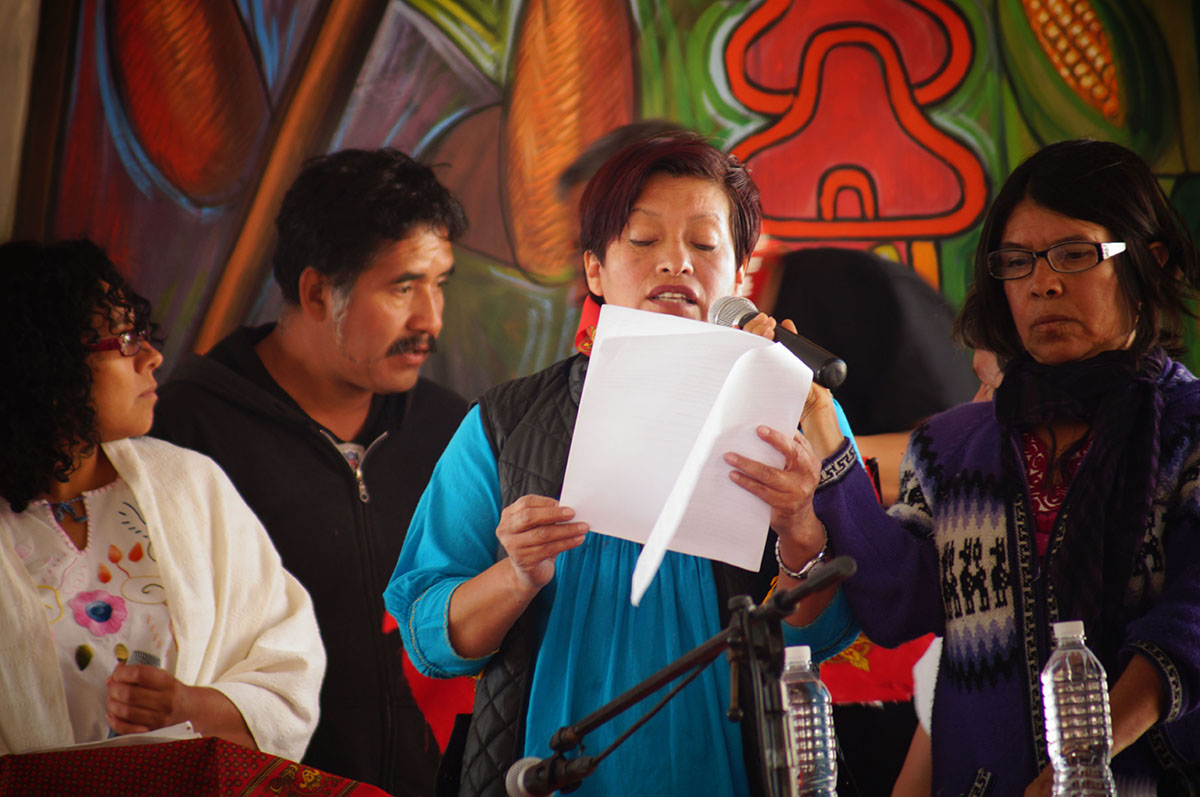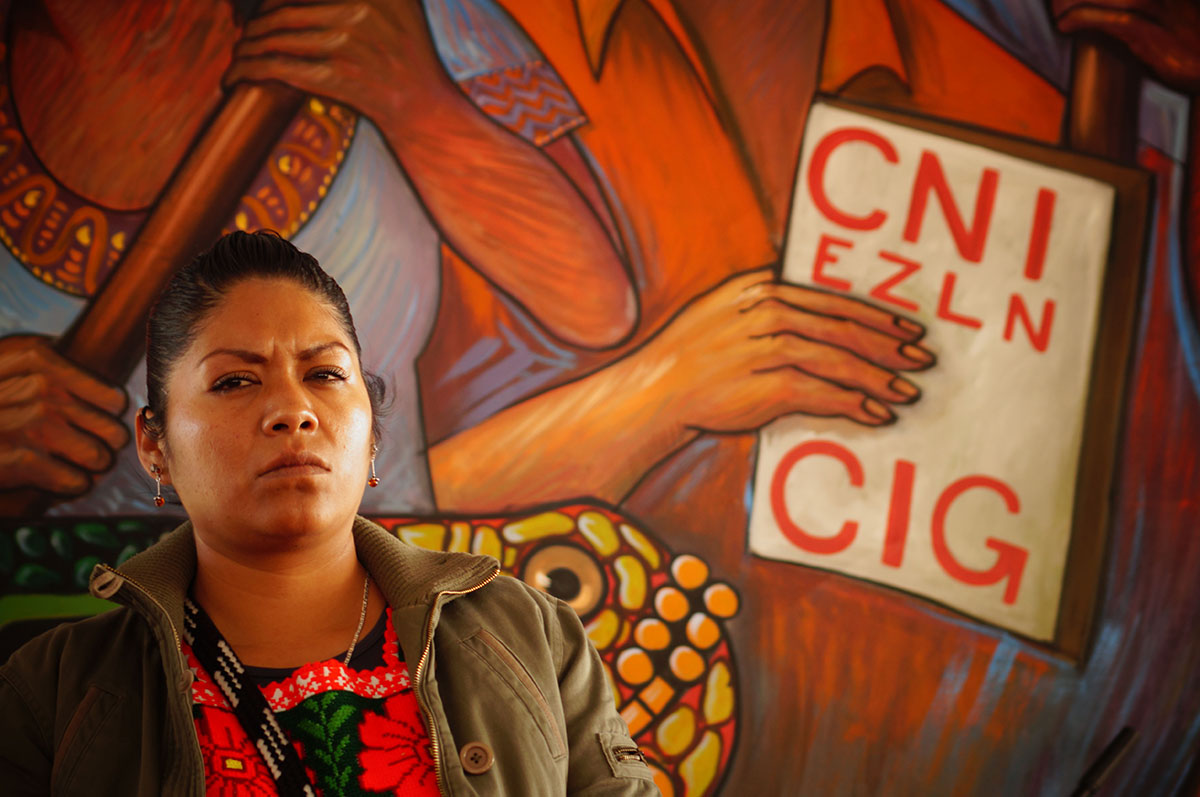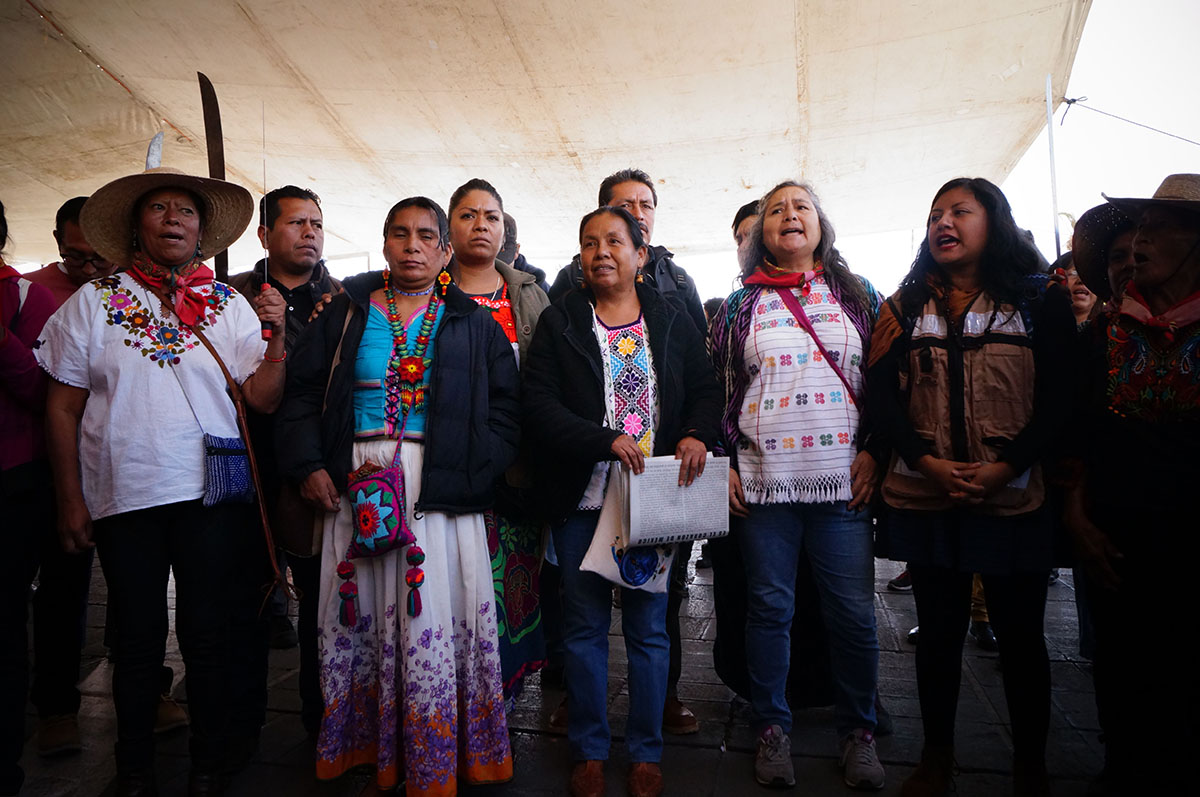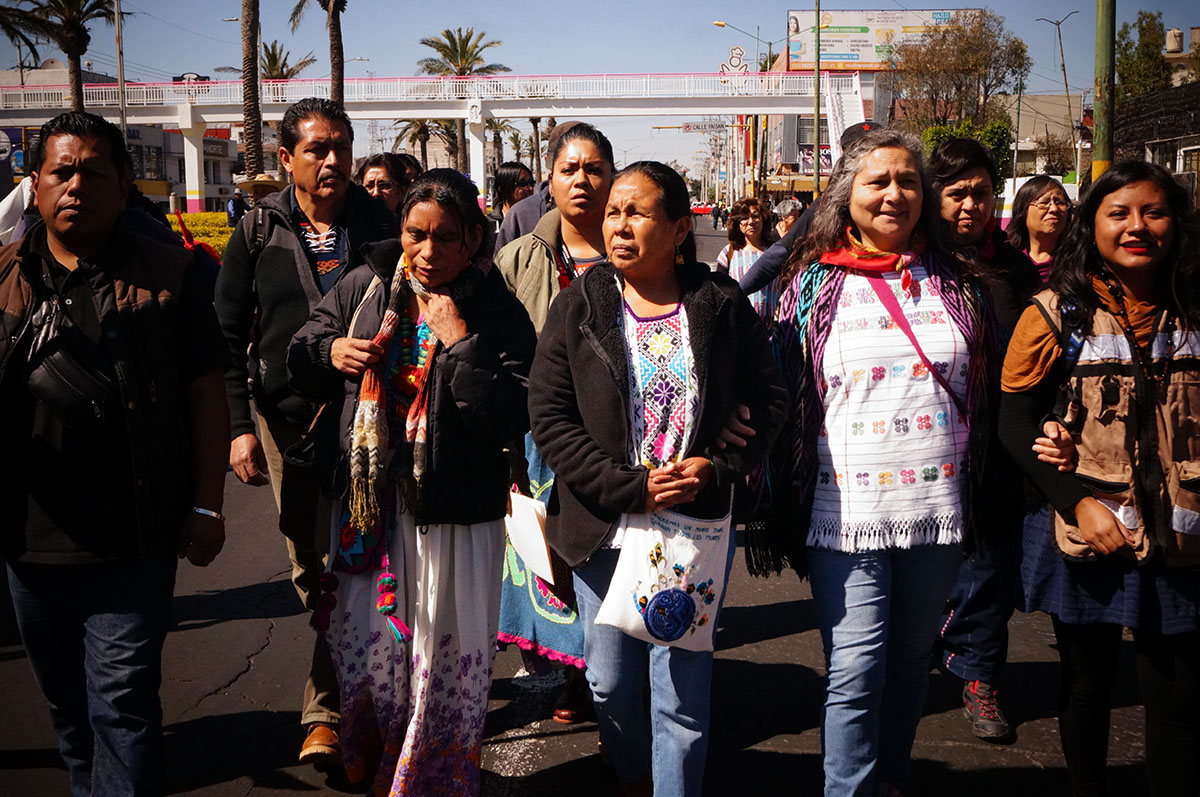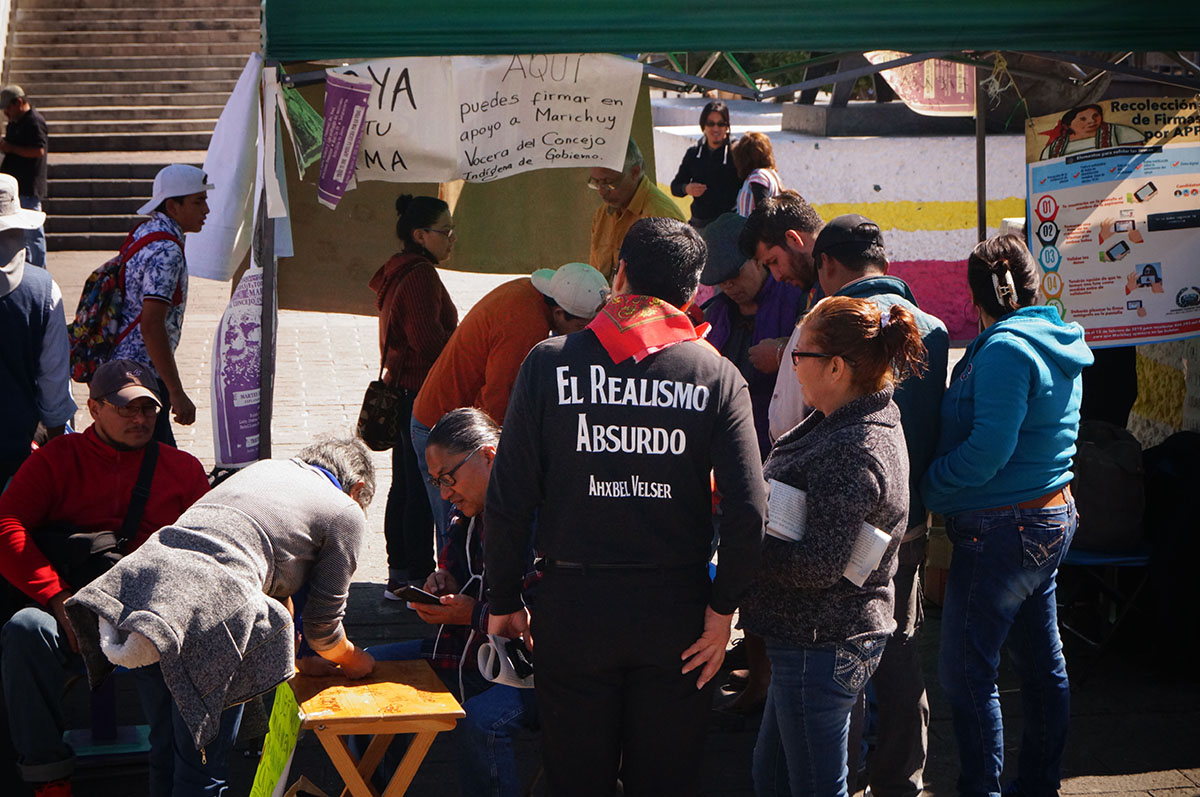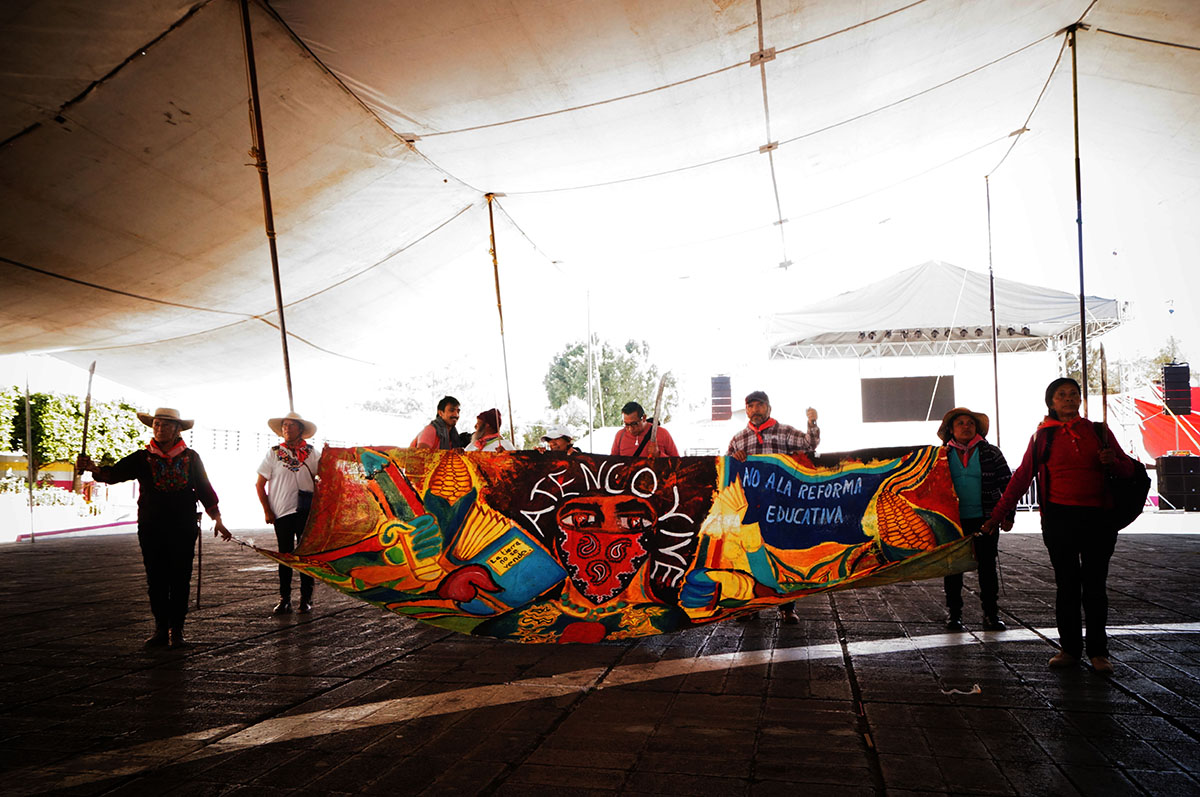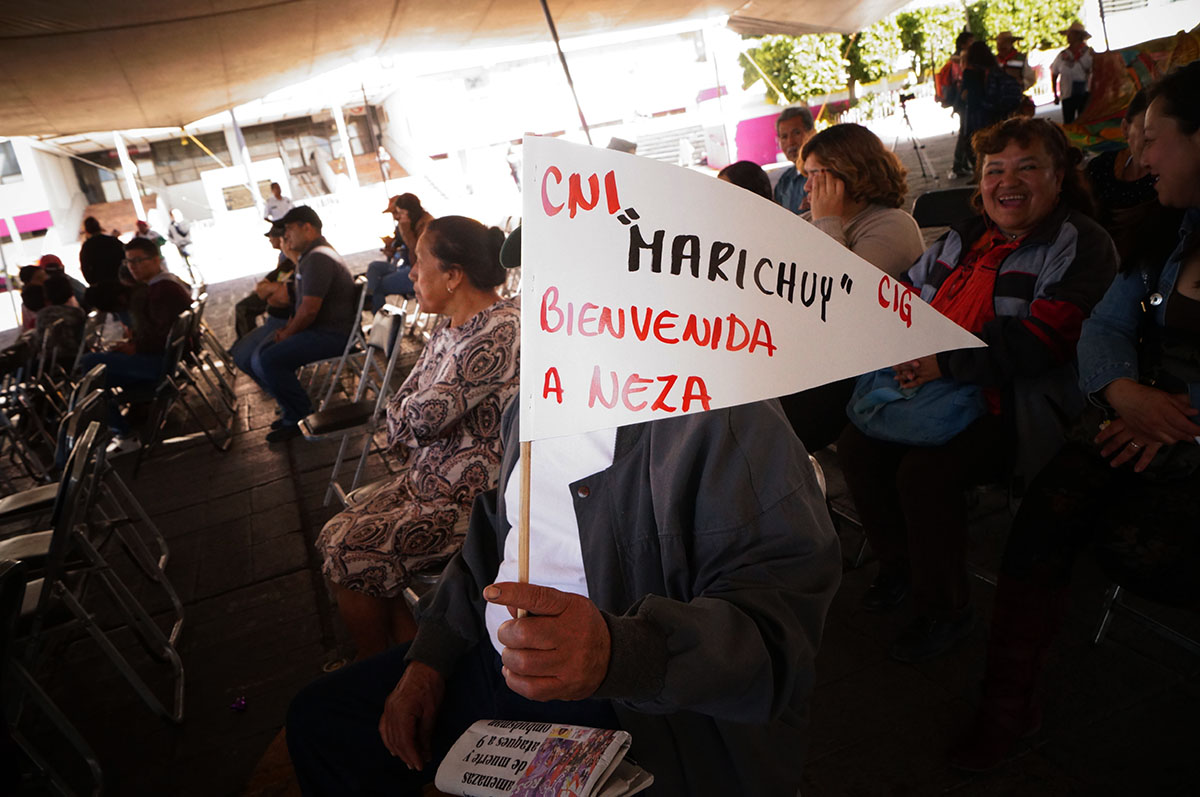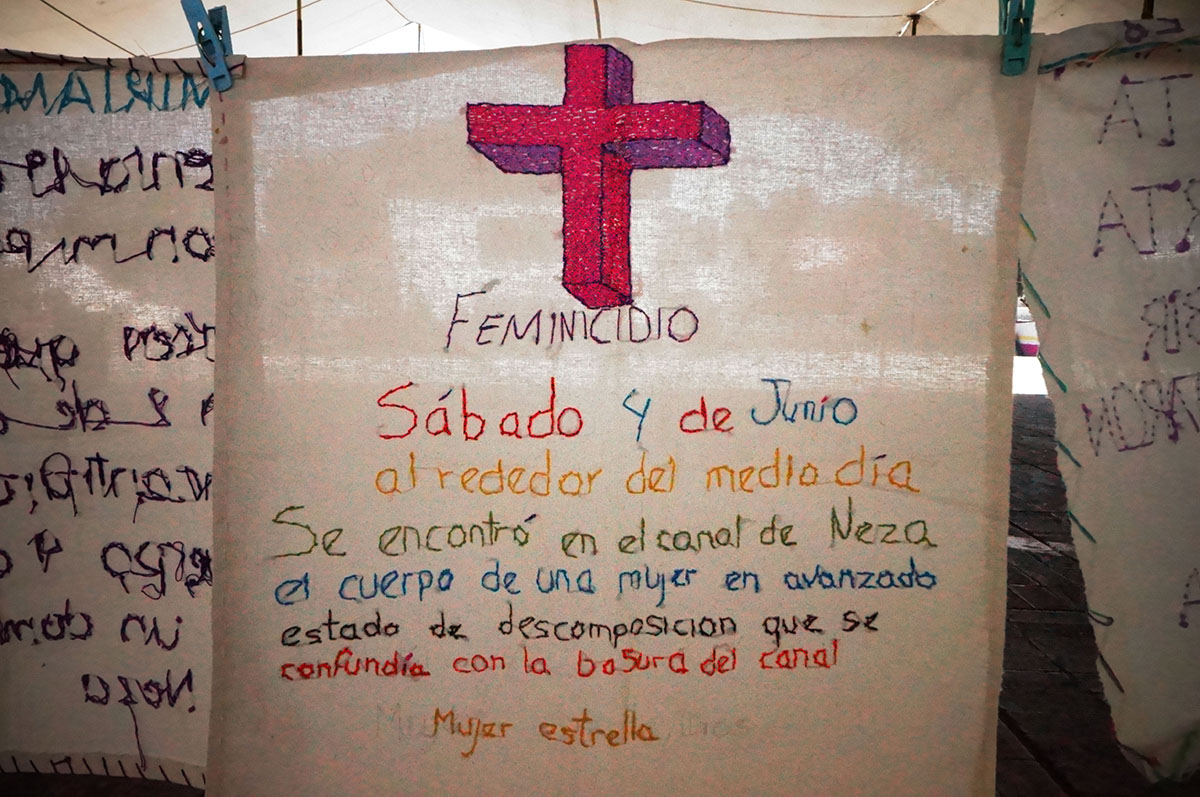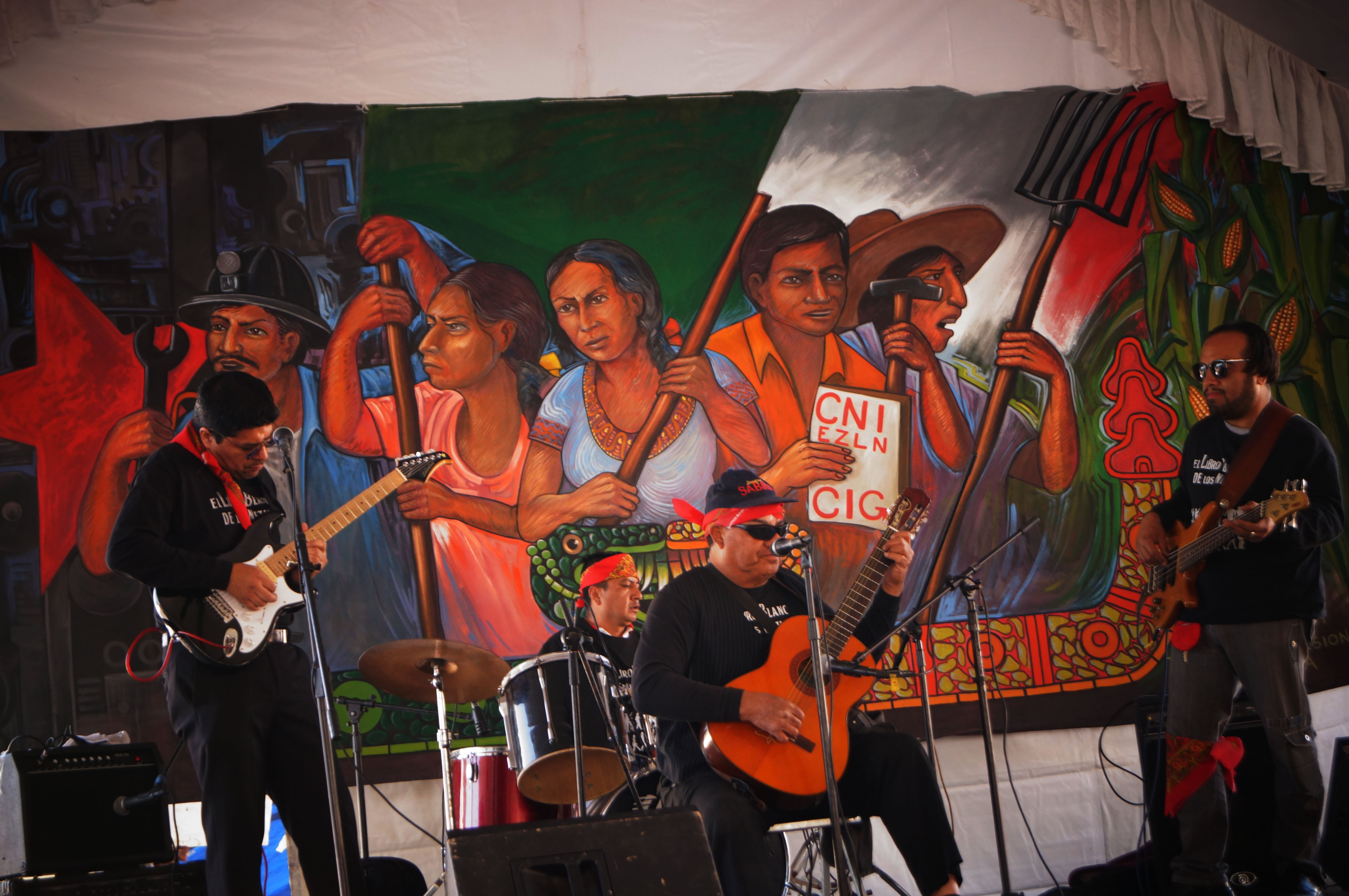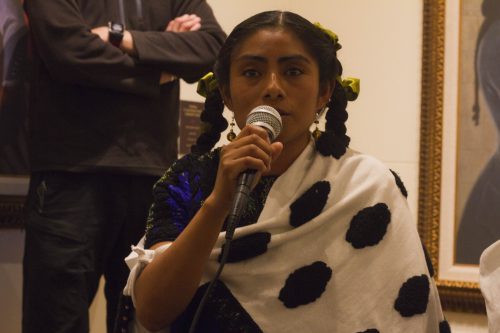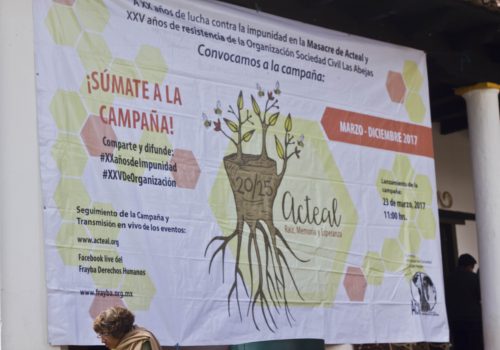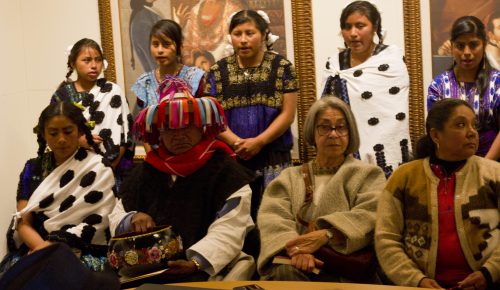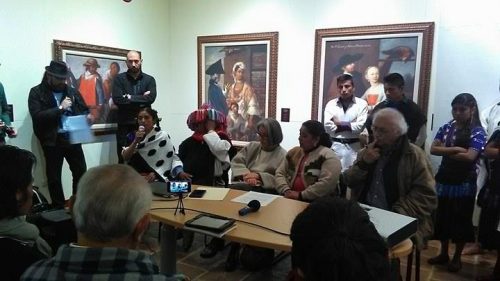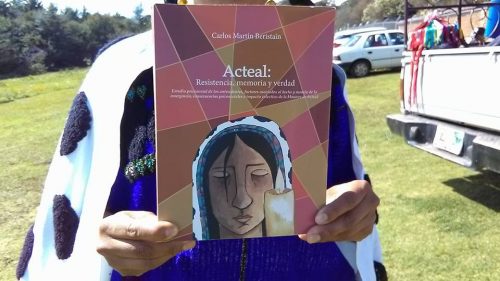
Video
(Español) Mujeres de Acteal logran la liberación de 9 presos injustamente
“La fuerza del espíritu colectivo venció a la violencia”, dijo el compañero de nuestro colectivo que estuvo presente en Acteal este 9 de enero de 2018.
Este martes 9 de enero, 22 mujeres de la Sociedad Civil Las Abejas de Acteal lograron liberar a los nueve miembros de su organización presos arbitrariamente en la comunidad de Río Jordán, colonia Miguel Utrilla Los Chorros, municipio de Chenalhó. Veintidos mujeres, 13 de ellas sobrevivientes de la masacre de Acteal y cuatro con bebés en brazos, arribaron a esa comunidad que, en la década de 1990, fue el principal centro de actividad paramilitar que desembocó en la masacre de Acteal en diciembre de 1997, y donde se sabe que hoy residen muchos de los autores materiales de dicha masacre. Veintidos mujeres armadas sólo con grandes banderas blancas inscritas con la palabra PAZ, una imagen de la Virgen de Guadalupe y una del Señor de Tila, dispuestas a enfrentar con sus cantos y su dignidad a quienes 20 años atrás asesinaron a sus familias.
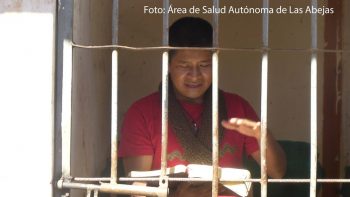 Cuatro días antes, el 5 de enero, José Ramón Vázquez Entzín, miembro del Congreso Nacional Indígena e integrante de Las Abejas de Acteal, transitaba por Río Jordán con un camión de arena que había comprado para construir su casa. Desafortunadamente, el camión se atascó en el lodo y ya no pudo salir. Los pobladores, al darse cuenta que el camión le pertenecía a Juan Vázquez, convocaron una asamblea urgente y, con las autoridades de la comunidad, detuvieron a José, supuestamente porque no tenía derecho a usar el camino. Esto porque, en 2015, José y Antonio Ramírez Pérez, ambos integrantes de Las Abejas, se negaron a aceptar un proyecto de drenage del gobierno, lo que les costó el corte de luz y agua y, en 2017, el encarcelamiento de cuatro compañeros.
Cuatro días antes, el 5 de enero, José Ramón Vázquez Entzín, miembro del Congreso Nacional Indígena e integrante de Las Abejas de Acteal, transitaba por Río Jordán con un camión de arena que había comprado para construir su casa. Desafortunadamente, el camión se atascó en el lodo y ya no pudo salir. Los pobladores, al darse cuenta que el camión le pertenecía a Juan Vázquez, convocaron una asamblea urgente y, con las autoridades de la comunidad, detuvieron a José, supuestamente porque no tenía derecho a usar el camino. Esto porque, en 2015, José y Antonio Ramírez Pérez, ambos integrantes de Las Abejas, se negaron a aceptar un proyecto de drenage del gobierno, lo que les costó el corte de luz y agua y, en 2017, el encarcelamiento de cuatro compañeros.
Dos días después de la detención de José Vázquez, Las Abejas de Acteal organizaron una comisión de diez personas para visitarlo, compuesta por sobrevivientes de la masacre, promotores y promotoras de salud y un catequista. La promotora de salud María Vázquez, que formó parte de la comisión, relató lo sucedido ese 7 de enero.
Traducción de sus palabras al español: [podcast]https://radiozapatista.org/wp-content/uploads/2018/01/Acteal9enero2018_Maria_HechosChorros_tradEsp.mp3[/podcast]
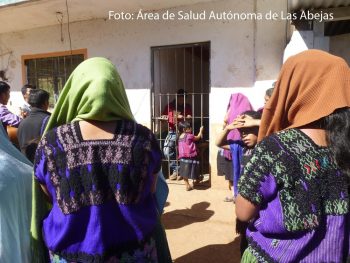 La comisión llegó alrededor de medio día y dio inicio a una jornada de oración y ayuno, al tiempo que las y los promotores revisaban a José para determinar su estado de salud. Terminada la oración, levantaron el ayuno e iniciaron un convivio con rezos y cantos. Sin embargo, a pesar de tratarse de una iniciativa pacífica, los pobladores de Río Jordán se indignaron con su presencia y, junto con el agente municipal, detuvieron a los ocho hombres de la comisión, dejando libres a las dos mujeres, ambas promotoras de salud, después de interrogarlas. Una de ellas, sobreviviente de la masacre, declaró que en el interrogatorio se encontraba Víctor López López, “quien es uno de los autores materiales de la Masacre de Acteal y quien anda contando cínicamente en su comunidad que cuando masacraban a las mujeres el día 22 de diciembre de 1997, cuenta con orgullo que también las violaban”.
La comisión llegó alrededor de medio día y dio inicio a una jornada de oración y ayuno, al tiempo que las y los promotores revisaban a José para determinar su estado de salud. Terminada la oración, levantaron el ayuno e iniciaron un convivio con rezos y cantos. Sin embargo, a pesar de tratarse de una iniciativa pacífica, los pobladores de Río Jordán se indignaron con su presencia y, junto con el agente municipal, detuvieron a los ocho hombres de la comisión, dejando libres a las dos mujeres, ambas promotoras de salud, después de interrogarlas. Una de ellas, sobreviviente de la masacre, declaró que en el interrogatorio se encontraba Víctor López López, “quien es uno de los autores materiales de la Masacre de Acteal y quien anda contando cínicamente en su comunidad que cuando masacraban a las mujeres el día 22 de diciembre de 1997, cuenta con orgullo que también las violaban”.
El agente municipal de Río Jordán exigió que las autoridades de Las Abejas acudieran al lugar y pagaran una multa de 5 mil pesos por persona para liberar a los detenidos.
Dos días después, el 9 de enero, la organización Las Abejas de Acteal recibió información por parte de la alcaldesa de Chenalhó Rosa Pérez en el sentido de que ese día liberarían a los nueve presos y que se establecería una mesa de diálogo. Sin embargo, pobladores de Río Jordán también afirmaban que, aunque liberarían a los presos, a las 14 familias de Las Abejas que residen en Río Jordán les quemarían sus casas, venderían sus tierras para que no pudieran regresar, los golpearían e incluso podrían llegar a quitarles la vida.
Fue entonces que las mujeres de Acteal decidieron formar una nueva comisión, esta vez compuesta exclusivamente por mujeres.
Al mismo tiempo, organizaciones solidarias acudieron a Acteal y los medios libres estuvieron difundiendo los acontecimientos en sus páginas y en las redes sociales, información que fue replicada en muchos lugares en México y en el mundo.
La presión logró que se liberaran a los nueve presos. Sin embargo, en vez de entregarlos a las mujeres, los subieron a dos camionetas del gobierno, sin placas, sin informarles a dónde se disponían a llevarlos. Entre burlas y ofensas por parte de los hombres de la comunidad, las mujeres exigieron que se les informara a dónde los llevarían. El agente del gobierno dijo que a la cabecera municipal de Chenalhó. Conscientes del peligro de secuestro, las mujeres dijeron que no.
Guadalupe Vázquez, una de las mujeres presentes, sobreviviente de la masacre de Acteal y concejala del Concejo Indígena de Gobierno, relató lo sucedido.
Se dirigieron entonces al crucero Majomut, donde se les unieron otras integrantes de Las Abejas, que se movilizaron desde Acteal junto con miembros de organizaciones solidarias y de los medios libres. Allí, mujeres y niños impidieron el paso de las camionetas y forzaron a los representantes del gobierno a liberar a los presos y a acordar la creación de una mesa de diálogo.
Ya en Acteal, se celebró una ceremonia de agradecimiento. Agradecer a Dios, agradecer a las organizaciones e individuos solidarios, agradecer a la fuerza de las mujeres, a la perseverancia de la organización, a la vida. Agradecer.
[podcast]https://radiozapatista.org/wp-content/uploads/2018/01/Acteal9enero2018_oracion.mp3[/podcast]
En Acteal, esa noche, el espíritu colectivo había vencido a la violencia. Con su dignidad, con su sencillez, con su organización, con su valor, las mujeres de Acteal nos enseñaban que es posible enfrentar el odio, la violencia y el terror no con más odio y más violencia, sino con organización, amor y dignidad.
Fotos: Regeneración Radio, Las Abejas, Radio Zapatista
Texto y audios: Radio Zapatista
Videos: Medios libres
(Español) Gira del CIG y su vocera Marichuy en los Caracoles Zapatistas (Video)
La visita de la vocera, Marichuy, del Concejo Indígena de Gobierno a los 5 Caracoles Zapatistas es un momento clave en la historia del movimiento indígena en México y de las luchas altermundistas en el mundo. En este video podrás escuchar y ver a las bases zapatistas, lxs solidarios y los medios libres que recibieron y acompañaron el caminar de los concejales del CIG nombrados por sus comunidades para caminar la dignidad, la rebeldía, la resistencia, la autonomía y la esperanza en el marco del proceso electoral mexicano 2017-2018.
